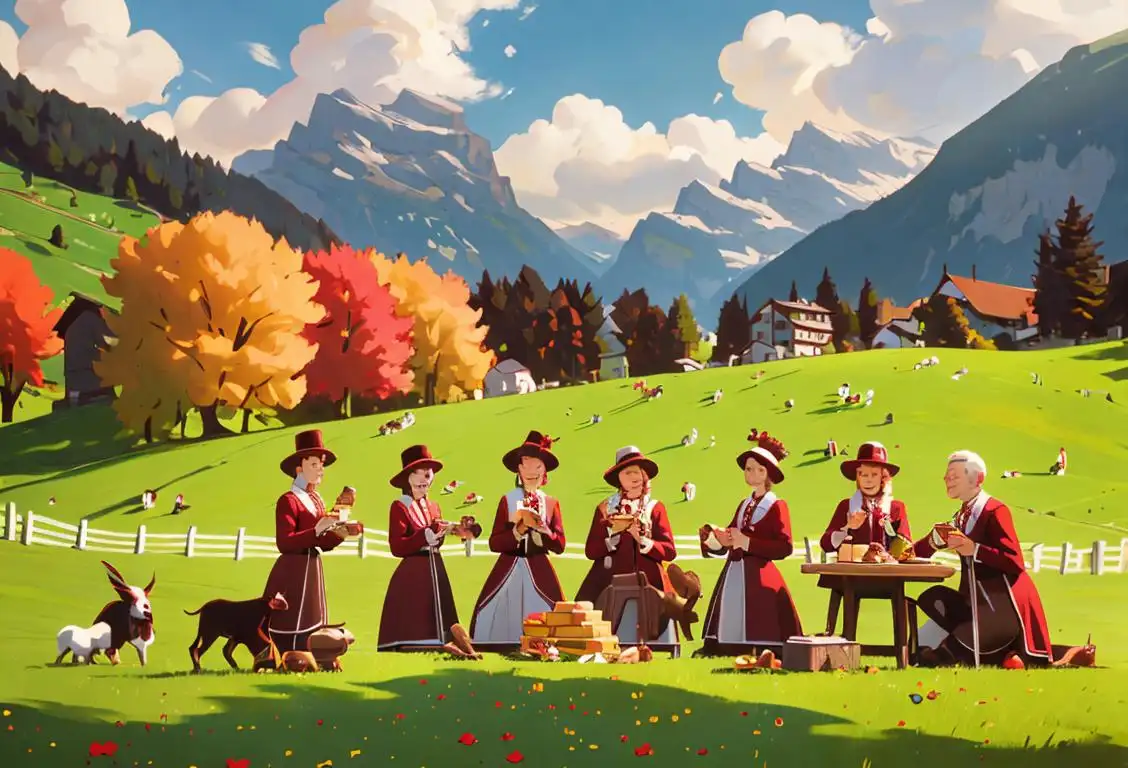National Switzerland Day

Welcome to National Switzerland Day, the day where we celebrate all things Swiss! Get ready for a day filled with Swiss chocolates, cheese, and the sweet sound of yodeling. So put on your lederhosen and embrace your inner Swissness!
When is Switzerland Day?
It's national switzerland day on the 1st August.
The History of National Switzerland Day
On National Switzerland Day, we commemorate the foundation of the Swiss Confederation back in 1291. Legend has it that on this day, three cantons (which are kind of like Swiss states) joined forces to form an alliance that laid the groundwork for the country we know and love today.
The Swiss are known for their neutrality, bank accounts, and of course, their delicious chocolate. But did you know that Switzerland is also famous for inventing the Swiss army knife? That's right, they managed to create a tool that can do just about anything, from opening wine bottles to fixing a loose screw. It's like the Swiss army knife of tools!
How to Celebrate National Switzerland Day
Now, you might be wondering how to properly celebrate National Switzerland Day. Don't worry, we've got you covered:
1. Indulge in Swiss Chocolate: Treat yourself to some mouthwatering Swiss chocolate. Whether it's a classic Toblerone or a bar of smooth Lindt chocolate, you won't be disappointed.
2. Try Some Swiss Cheese: Switzerland is famous for its cheese, so why not taste a variety of flavors? Enjoy a traditional fondue or simply savor a slice of Emmental. Cheese lovers rejoice!
3. Yodel Your Heart Out: Embrace your inner alpine spirit and give yodeling a try. Warning: Yodeling may cause uncontrollable laughter and strange looks from your neighbors.
4. Explore Swiss Scenery: Switzerland is blessed with stunning landscapes. Take a virtual tour or plan a future trip to visit the breathtaking Swiss Alps and charming cities like Geneva and Zurich.
Fun Fact
Did you know that Switzerland has more bank accounts than people? It seems like even the cows and goats in the Swiss countryside have their own personal bank accounts! Talk about financial inclusivity.
History behind the term 'Switzerland'
1291
The birth of the Swiss Confederation
In the year 1291, three cantons in the region of modern-day Switzerland (Uri, Schwyz, and Unterwalden) formed a defensive alliance known as the Swiss Confederation. This alliance was primarily formed for protection against external threats and to maintain peace and independence within the region. The term 'Switzerland' did not exist at this time, but the seeds of the nation were sown.
1500s
The emergence of Swiss mercenaries
During the 1500s, Switzerland gained a reputation for its skilled mercenaries. The Swiss soldiers were known for their discipline, bravery, and expertise in war. They were highly sought after by various European powers to serve in their armies. The term 'Switzerland' began to be associated with these renowned mercenaries, thus increasing the recognition of the region on an international level.
1798
The French invasion and the Helvetic Republic
In 1798, the French Revolutionary Army, led by Napoleon Bonaparte, invaded Switzerland. As a result, the Swiss Confederation was overthrown, and a new centralized government called the Helvetic Republic was established under French influence. This period marked the first time the term 'Switzerland' was used as an official name for the country, although it was still under French control.
1815
The Congress of Vienna and Swiss neutrality
Following the end of the Napoleonic era, the European powers recognized Switzerland's independence and neutrality at the Congress of Vienna in 1815. This recognition solidified Switzerland's status as a sovereign nation and defined its borders. The term 'Switzerland' became widely accepted as the official name for the newly recognized country.
1848
The Swiss Federal Constitution
In 1848, the Swiss Federal Constitution was adopted, establishing a federal state structure and granting more rights and freedoms to the Swiss citizens. This marked a significant step towards modern Switzerland as we know it today. The constitution solidified the term 'Switzerland' as the official name and emphasized the principles of neutrality, federalism, and direct democracy, which continue to shape the country's identity.
1907
Swiss neutrality recognized internationally
In 1907, the major European powers signed the Hague Convention, formally recognizing Switzerland's perpetual neutrality. This international recognition further solidified Switzerland's reputation as a neutral and peace-loving nation. The term 'Switzerland' became synonymous with neutrality, diplomacy, and humanitarian efforts.
Did you know?
Did you know that Switzerland has more bank accounts than people? It seems like even the cows and goats in the Swiss countryside have their own personal bank accounts! Talk about financial inclusivity.Tagged
food fun travelFirst identified
1st August 2015Most mentioned on
1st August 2020Total mentions
9Other days
Houston Day
Vermont Day
Ohio Day
Capital In Broad Day
Illinois Day
New Hampshire Day
Irish Coffee Day
Virtual Vacation Day
Hawaii Day
Regional At Best Day









